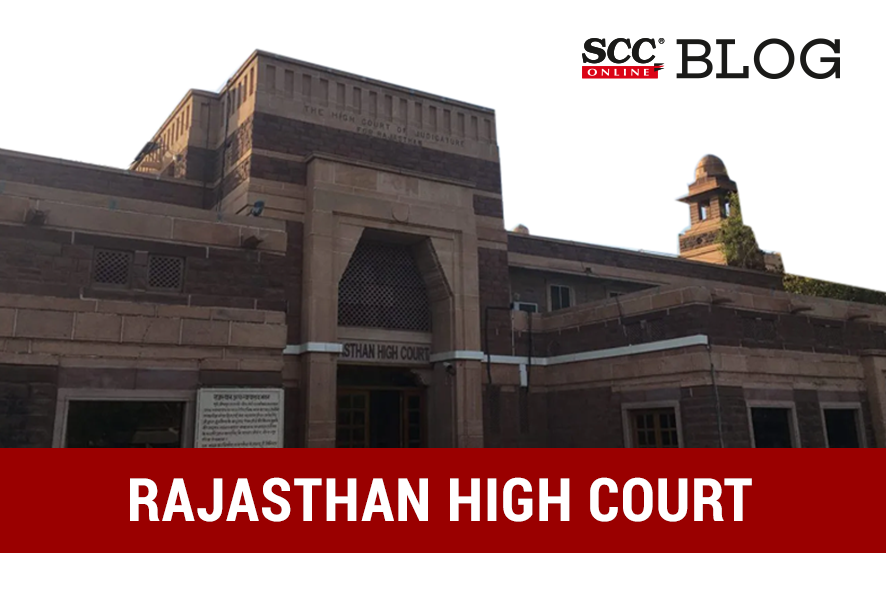Rajasthan High Court: In a writ petition filed by Husband (‘petitioner’) seeking to set aside the order passed by the Family Court , wherein the Court allowed the application filed by him under Order 6 Rule 17 with Section 151 of Code of Civil Procedure (‘CPC’), 1908, Pushpendra Singh Bhati, J. reiterated that for protecting the best interest of the child, the DNA Paternity test cannot be allowed in a routine manner, and that the same can only be permitted in exceptional circumstances. Thus, the Court dismissed the petition and said that the husband cannot take the undue advantage of DNA test on child to prove wife’s adultery.
Background
The parties got married in 2010 and the child was born in2018. The wife had left her husband’sr house in2019. Now, the husband has filed an application under Section 13 of the Hindu Marriage Act, 1955 for divorce on the grounds of cruelty. After the release of the Deoxyribonucleic Acid (‘DNA’) Paternity Test Report which revealed that the husband is not the father of the child, he wanted to amend the application, claiming it to be the development in the case before the Family Court. But it was rejected by the Family Court. Thus, the husband filed the present petition.
Issues and Analysis
I. Whether the wife can be compelled to give DNA of her son in a matrimonial matter to prove or disprove the Paternity/Adultery?
The Court took note of Section 112 of the Evidence Act, 1872 and the decision in Aparna Ajinkya Firodia v. Ajinkya Arun Firodia, 2021 SCC OnLine Bom 11774, wherein it was held that the husband , cannot take undue advantage of DNA Test so as to shirk away from his obligation as a father of the child. Further, it was said that the DNA tests of children born during the subsistence of a valid marriage may be directed only when there is sufficient prima-facie material to dislodge the presumption under Section 112 of the Evidence Act. Further, if no plea has been raised as to non-access, in order to rebut the presumption under Section 112 of the Evidence Act, a DNA test may not be directed. Further, in Aparna Ajinkya Firodia (supra), it was also observed that ““access” or “non-access” does not mean actual cohabitation but means the “existence” or “non-existence” of opportunities for sexual relationship”
Thus, the Court held that the husband in the present case cannot take undue advantage of DNA test as the same could not be done without the justifiable reason. Further, theDNA test canonly be directed when the case falls outside Section 112 of the Evidence Act. In the present case, questions regarding presumption could not arise as the husband had access to the wife.
II. Whether litigation between husband and wife should consider paternity as a requirement for proving any point of civil wrong/matrimonial wrong pertaining to adultery?
The Court observed that adultery is already criminalised in the case of Joseph Shine v. Union of India, 2018 SCC OnLine SC 783. Further, any matrimonial dispute pertaining to the child cannot be used for their own benefit by way of DNA test. DNA test will be conducted only in exceptional or rarest of rare cases.
III. Impact of the paternity test upon the child and such test be allowed or taken on record? and IV. Requirement of paternity test and its implications in matrimonial law?
The Court observed that DNA Paternity Test cannot be conducted or ordered to be conducted in a routine and mechanical manner, because it would certainly adversely affect the very mental health of the child. It is thus necessary to see whether there is any access between the husband and wife.
The Court said that it is necessary to saw the access between husband and wife and if the party questioning the legitimacy of child showed that the parties to the marriage had no access to each other, then the benefit of Section 112 will not be available to the party. The Court observed that child’s right should not be affected because of matrimonial dispute between husband and wife. Further, a child should not be used as a pawn in divorce litigation.
Therefore, the Court said that the presumption under Section 112 of the Indian evidence Act, 1872 was not drawn in the present case as the parties were living together at time of birth of the child, thus, they had access to each other at the time of birth of the child.
The Court said that the DNA Test is invading upon the rights of a child, which may range from affecting his property rights, right to lead a dignified life, right to privacy and right to have the confidence and happiness of being showered with love and affection by both parents.
The Court also said that the pain of winning or losing a battle of divorce amongst the contesting spouses is much trivial when compared with the rights of the child to have dignity and parenthood.
The Court did not find the case fit to grant any relief and thus dismissed the petition.
[X v Y, 2023 SCC OnLine Raj 1075, decided on 26-05-2023]
Advocates who appeared in this case :
For the petitioner: Senior Advocate Dr. Sachin Acharya.







